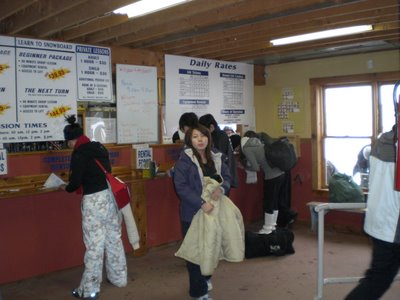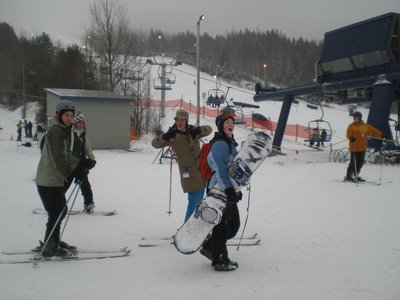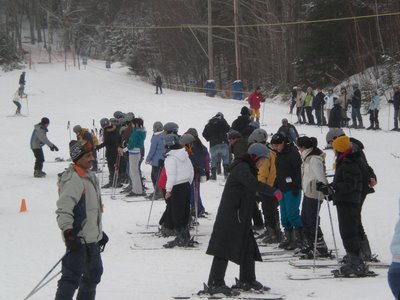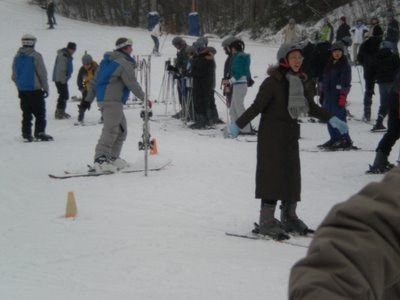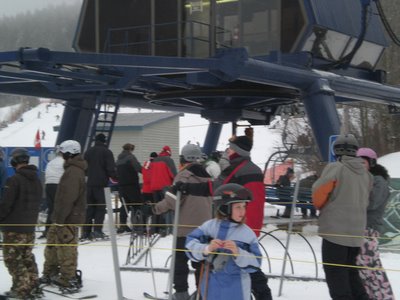Monday, February 26, 2007
Today, the DSU launched a new version of www.dsu.ca. Rather than outsourcing the creation of a new site to an external organization, the DSU employed the ACM (a student society) and Andrew Shouldice (a computer science student) to develop and design the new website. We’ve worked long and hard on creating a student-friendly site with improved functionality, up-to-date information, and a sleek new look. A union for students, by students.
Wednesday, February 21, 2007
Finance Canada Consultation
The Federal Department of Finance is conducting another highly unpublicized consultation with a small window for submissions. This is a pre-budget consultation open to all Canadians. Both our provincial lobby group ANSSA and our federal lobby group CASA will be submitting a response that focuses on funding the postsecondary education system in Canada.
Monday, February 19, 2007
Teaching Award Nominations
The end of this week marks the deadline for submitting nominations for outstanding Dalhousie professors who deserve to win a coveted DSU Teaching Award.
To nominate a prof, find a form online here, fill it out and turn it in to the DSU offices (hard copies are also available). The ceremony will be held on March 13th at 7pm.
To nominate a prof, find a form online here, fill it out and turn it in to the DSU offices (hard copies are also available). The ceremony will be held on March 13th at 7pm.
Sunday, February 18, 2007
CBIE Survey of International Students
The Canadian Bureau for International Education (CBIE) is asking international students (in their final year of study) and graduates to participate in a web-survey on ‘International Graduates and the Canadian Labour Market’. International students are increasing seen as an “untapped” resource for Canada, especially as it works to meet the labour challenges of today and those just on the horizon. This CBIE survey is a great opportunity for international students have their voice heard by decision- makers both nationally and provincially.
The survey is open until Wednesday, February 28, 2007 and should take about 15 to 20 minutes to complete.
The survey is open until Wednesday, February 28, 2007 and should take about 15 to 20 minutes to complete.
Thursday, February 15, 2007
Tuition Part II
It seems that all the CFS's Day of Action has done is bring out a bunch of really good arguments about why reducing tuition across the board is a bad idea. Check out these two post here and here by Stephen Gordon an economics profesor at l'Université Laval in Quebec City. Margaret Wente also discusses the issue in the Globe and Mail today. Her column is only available online to subscribers, but it is worth picking up a hard copy.
Wednesday, February 14, 2007
Elections Committee Blog
The DSU Elelctions committee has set up a blog for this years elections. If you need info on running, or want the behind the scenes look at what the committee is up to check it out here.
Tuesday, February 13, 2007
Partnerships Press Conference
Last Tuesday, our provincial (ANSSA) and federal (CASA) lobby groups participated in a press conference with six other education lobby groups across the country (NBSA, CSA, ACTISEC, CAUS, OUSA, and GSAC). The press conference was held in the Ontario legislature around this document (en Français).
Media coverage can be found here, here, here, here, and here.
This was also covered on the postsecondary education blog
Media coverage can be found here, here, here, here, and here.
This was also covered on the postsecondary education blog
Tuition
These two letters in the Globe and Mail here and here were posted on Dale Kirby’s Postsecondary Education blog last week. These two letter demonstrate how complicated the whole issue of tuition fees in Canada really is. It is very clear that tuition fees are not the sole barrier to a postsecondary education. For example, look at tuition fees and participation rates in Quebec and Nova Scotia. Nova Scotia has the highest tuition fees in the country, but we also have one of the highest participation rates (33%), as opposed to Quebec which has the lowest tuition fees and one of the lowest participation rates (20%). One can also look at the fact, that although Nova Scotia has the highest tuition fees students from other provinces flock to this provinces to go to university. I don't know why this is, but it definitely cannot be because we are the most expensive. Stats Can has also released a study that looks at factors besides tuition that affect access to postsecondary education.
What is the point of all this? I don't know what the answer is, but I do know that simply reducing or eliminating tuition in Canada will not solve the problem of getting students from traditionally underrepresented groups, or low income backgrounds into our postsecondary education system. There is no doubt that Nova Scotia needs to get its fees in line with the rest of the country, but the bigger question for me is what we do once we get there.
What is the point of all this? I don't know what the answer is, but I do know that simply reducing or eliminating tuition in Canada will not solve the problem of getting students from traditionally underrepresented groups, or low income backgrounds into our postsecondary education system. There is no doubt that Nova Scotia needs to get its fees in line with the rest of the country, but the bigger question for me is what we do once we get there.
Monday, February 12, 2007
PSE on CBC
 Yesterday, CBC Radio's Cross Country Checkup with Rex Murphy devoted its two-hour show to the issue of post-secondary education funding. One of the guests by phone was DSU President Ezra Edelstein who also serves as chair of the Canadian Alliance of Student Associations. You can listen to a clip of Ezra and Rex discussing PSE by clicking on the link below or you can check out the whole show here.
Yesterday, CBC Radio's Cross Country Checkup with Rex Murphy devoted its two-hour show to the issue of post-secondary education funding. One of the guests by phone was DSU President Ezra Edelstein who also serves as chair of the Canadian Alliance of Student Associations. You can listen to a clip of Ezra and Rex discussing PSE by clicking on the link below or you can check out the whole show here.Ezra on CBC Radio (.mp3 - 5 minutes)
This audio file is also available through the DSU Podcast.
Thursday, February 08, 2007
2 Audio Clips
I recently appeared on the NSPIRG radio show on CKDU to discuss education policy and student activism within our student lobby groups CASA and ANSSA as well as the student space referendum.
In the first clip, what I thought would be a friendly discussion turns into a debate with Ian Boyko, a three-time national chairperson of CFS (2001-2004) and now a staff member at their Ottawa office.
A couple things I'd like to note for clarification: not only is the Acadia Student Union not a member of CFS as is stated in this broadcast, but the President and Vice President Academic of the ASU chair CASA's campaign and policy committees, respectively. The ASU VPA is also treasurer of ANSSA.
It's not worth my time to point out all the problems with the CFS and you'll notice in this interview I stay positive and talk about ways we can work together. If you'd like more information about the tactics and practices of the CFS I recommend checking out the studentunion.ca weblog and watching this series of investigative reports conducted by Global TV on alleged corruption within the CFS.
Finally, I mentioned the fact that CFS spent almost $300,000 on legal action with student unions last year, most of which is related to the TravelCuts lawsuit that CFS lost. The entire yearly budget for CASA is around $500,000. It boggles the mind how much students pay to CFS and what they spend that money on.
As I mentioned on-air, all CASA and ANSSA policies are available online.
Clip 1 (.mp3 - 32 minutes)
In the second clip, Emma and I discuss the new student space plan proposed by the university. There have been some interesting recent developments in this area. Because of the DSU's Imagine '07 consultative process, the University has updated its plan to acknowledge student concerns. This includes the creation of a new Grad House across the street from the current building.
Last night, the DSU council declined to officially support either side of the referendum. The vote will take place on March 6th and 7th.
Clip 2 (.mp3 - 7 minutes)
These clips have also been added to the DSU podcast. You can subscribe here.
In the first clip, what I thought would be a friendly discussion turns into a debate with Ian Boyko, a three-time national chairperson of CFS (2001-2004) and now a staff member at their Ottawa office.
A couple things I'd like to note for clarification: not only is the Acadia Student Union not a member of CFS as is stated in this broadcast, but the President and Vice President Academic of the ASU chair CASA's campaign and policy committees, respectively. The ASU VPA is also treasurer of ANSSA.
It's not worth my time to point out all the problems with the CFS and you'll notice in this interview I stay positive and talk about ways we can work together. If you'd like more information about the tactics and practices of the CFS I recommend checking out the studentunion.ca weblog and watching this series of investigative reports conducted by Global TV on alleged corruption within the CFS.
Finally, I mentioned the fact that CFS spent almost $300,000 on legal action with student unions last year, most of which is related to the TravelCuts lawsuit that CFS lost. The entire yearly budget for CASA is around $500,000. It boggles the mind how much students pay to CFS and what they spend that money on.
As I mentioned on-air, all CASA and ANSSA policies are available online.
Clip 1 (.mp3 - 32 minutes)
In the second clip, Emma and I discuss the new student space plan proposed by the university. There have been some interesting recent developments in this area. Because of the DSU's Imagine '07 consultative process, the University has updated its plan to acknowledge student concerns. This includes the creation of a new Grad House across the street from the current building.
Last night, the DSU council declined to officially support either side of the referendum. The vote will take place on March 6th and 7th.
Clip 2 (.mp3 - 7 minutes)
These clips have also been added to the DSU podcast. You can subscribe here.
Wednesday, February 07, 2007
Rich Student Poor Student - Post #4
Step 4: Be thrifty
This is an obvious one, and most students are really good at it, far better than I am. But there are a couple of things that I know about which I would like to pass on. Of course everyone knows about the staples of thrift, like: Value Village, Frenchy’s, and the Sunday Flea Market. Those of you that check your Dal E-mail account should also know about the Dump and Run that is put on by CESR in partnership with the university. This is an event where students drop off items that they don’t want to take with them when they move at the end of the year and they are sold in a large flea market. This can be a great place to pick up cheap furniture. Also there are a couple of good websites, like: Criag’s list and Bargainhunter.ca.
There are other ways to save a few bucks while in school. The DSU offers things like free use of Quicktax for doing your taxes online (this is only available to students that make under $20,000), and free legal aid, free room rentals for societies, and a food bank. You can go to the offices on the second floor of the SUB to find out about all the services that we provide.
Another way to save money is to hit up the power hours. Let’s face it, a large amount of a budget can be eaten up by extra-curricular activities. You need to make sure that when having fun you don’t go too crazy. A good idea is to take cash out with you and leave your bank and credit cards at home. Alcohol and a credit card can be your worst enemy. Also go to the places where the drinks are cheap. Most bars have a difference of 50-100% in price from discount prices to regular prices. One anomaly to this is a campus bar. Our two bars have two power hours a night when open (Wed. – Fri.) and also have food specials. At the Grawood for example you can get a burger, fries, and a draft for $4.95+tax. Usually you can find out when drink specials are by going on a bars website, if they don’t have one then just give them a call.
I know that the things I’ve mentioned here aren’t going to be ground breaking revelations to most of you. The point that I am trying to get at is that there are a lot of different ways that you can save money while at school, and you should do your best to take advantage of them. This doesn’t mean that you have to live off Kraft dinner and wear tattered clothing, I’m a fan of living comfortably. But really, do you need a new Ipod right now?
Please, those of you that have ways to save money while in school, send me some suggestions and I will update this to let people know what you have said. If everyone gives one good way to save money we will all be a little richer.
This is an obvious one, and most students are really good at it, far better than I am. But there are a couple of things that I know about which I would like to pass on. Of course everyone knows about the staples of thrift, like: Value Village, Frenchy’s, and the Sunday Flea Market. Those of you that check your Dal E-mail account should also know about the Dump and Run that is put on by CESR in partnership with the university. This is an event where students drop off items that they don’t want to take with them when they move at the end of the year and they are sold in a large flea market. This can be a great place to pick up cheap furniture. Also there are a couple of good websites, like: Criag’s list and Bargainhunter.ca.
There are other ways to save a few bucks while in school. The DSU offers things like free use of Quicktax for doing your taxes online (this is only available to students that make under $20,000), and free legal aid, free room rentals for societies, and a food bank. You can go to the offices on the second floor of the SUB to find out about all the services that we provide.
Another way to save money is to hit up the power hours. Let’s face it, a large amount of a budget can be eaten up by extra-curricular activities. You need to make sure that when having fun you don’t go too crazy. A good idea is to take cash out with you and leave your bank and credit cards at home. Alcohol and a credit card can be your worst enemy. Also go to the places where the drinks are cheap. Most bars have a difference of 50-100% in price from discount prices to regular prices. One anomaly to this is a campus bar. Our two bars have two power hours a night when open (Wed. – Fri.) and also have food specials. At the Grawood for example you can get a burger, fries, and a draft for $4.95+tax. Usually you can find out when drink specials are by going on a bars website, if they don’t have one then just give them a call.
I know that the things I’ve mentioned here aren’t going to be ground breaking revelations to most of you. The point that I am trying to get at is that there are a lot of different ways that you can save money while at school, and you should do your best to take advantage of them. This doesn’t mean that you have to live off Kraft dinner and wear tattered clothing, I’m a fan of living comfortably. But really, do you need a new Ipod right now?
Please, those of you that have ways to save money while in school, send me some suggestions and I will update this to let people know what you have said. If everyone gives one good way to save money we will all be a little richer.

